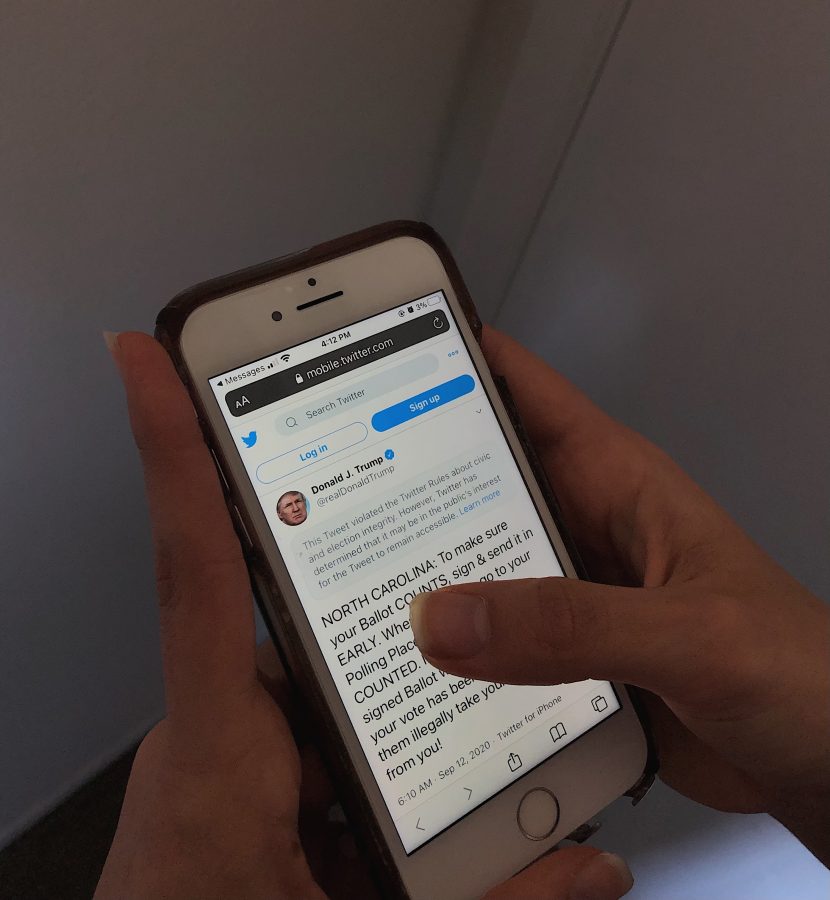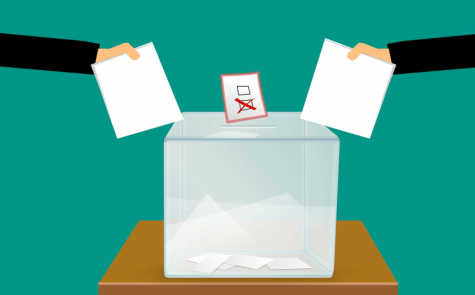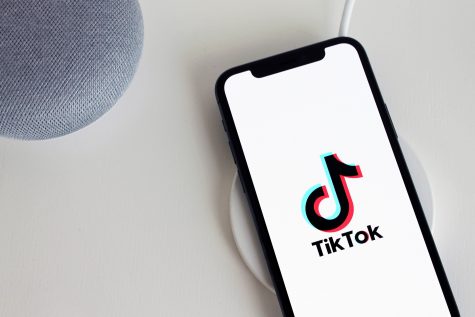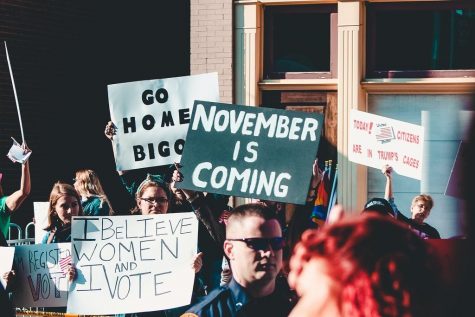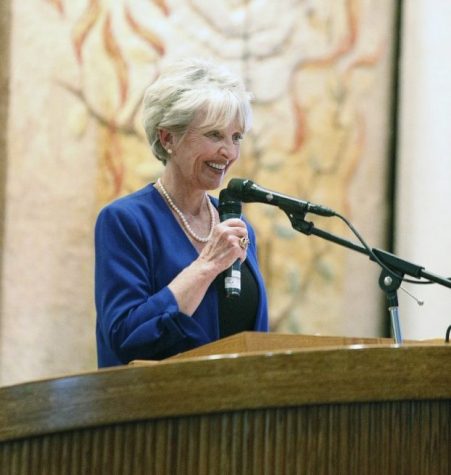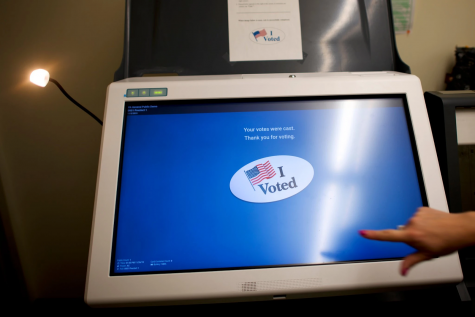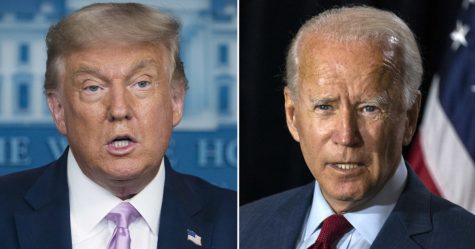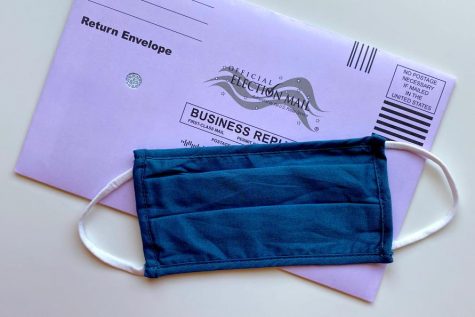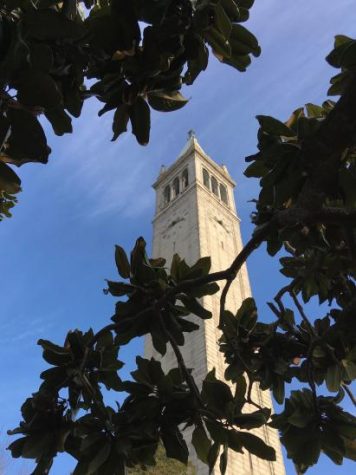When Politics and Social Media Collide: Twitter Fact Check
October 28, 2020
Donald Trump tweets to urge his followers in North Carolina to vote (Yasna Rahmani).
For years, Twitter has served as a platform for comedy, pop culture, news, and art. This election year, Twitter has become an online battleground for the presidential candidates and their running mates. When politicians utilize social media to advocate for their beliefs, they are given a chance to establish a stronger connection with their audience. However, amid partisan politics, information can often become twisted or misleading, especially when using Twitter, which does not require fact-checking before publicizing information. Polarization on social media has escalated to such an extent that many political figures have gotten their tweets flagged for containing misleading data. Are you wondering if you have read any misleading information on Twitter? Now you can find out.
False:
All states except for Indiana, Tennessee, Texas, Louisiana, and Mississippi, which require justification for the request of mail-in ballots, distribute mail-in ballots the same way. Registered voters are asked for their preferred voting method for the upcoming election. If they choose a mail-in ballot, it will be sent to them. President Trump is spreading the notion that the mail-in ballots are unsolicited, but voters have to knowingly pick the mail-in ballot option in order to receive one.
False:
According to an article written by Nicholas Riccardi for the Associated Press Fact Check, from the five states that usually send in mail-in ballots, there has never been any confusion when counting votes or any substantial accounts of fraud. In general, voter fraud is not a common occurrence. A study done in 2017 by the Brennan Center for Justice found that ballot fraud risk lies between 0.0004% and 0.0009%. Thus, mail-in voting does not add to the risk of voter fraud and abuse.
True to some extent:
While the president was quick to place a ban that currently denies the entry of foreign nationals who have traveled to China in the past 14 days, the ban does not include American citizens or green card holders who reside in China. Also,a ban on foreign travels was also not an original policy, as many countries found it necessary to take the same approach earlier on in the year.
True:
Both Joe Biden and Kamala Harris have dodged questions regarding the court-packing proposal. Even during the vice presidential debate, Harris did not speak on the subject after being persistently asked. Although Biden did not say that voters “don’t deserve to know”, Biden offered a vague stance at the campaign in Phoenix. “They’ll know my position on court-packing when the election is over,” he said. After much pressure, Biden finally revealed to WKRC-TV after a campaign event in Cincinnati, Ohio, that he is not a fan of the proposal.
True:
Despite the past conflict between Democratic governor Andrew Cuomo and President Trump, the governor praised the rapidity of the President’s response, using examples such as the construction of the military field hospital at the Javits Center. When the governor was asked whether Trump has done anything for his state during an interview for the Howard Stern Show, Cuomo explained, “He has delivered for New York. He has.”

True:
“I was totally surprised…The use of my name and my words by the G.O.P. campaign was done without my permission, and the actual words themselves were taken out of context, based on something that I said months ago regarding the entire effort of the task force,” Dr. Fauci said in a statement given to CNN about the new Trump campaign ad.
“Donald Trump paid $750 in taxes. When I first heard about it, I literally said, “You mean $750,000?” Democratic Vice Presidential candidate, Kamala Harris, tweeted on October 7th, 2020
True:
According to an article by the New York Times, despite consistently guarding his tax filings, it was revealed that the year President Trump ran for office and started his first term as president, he paid $750 in taxes. In another article by Josh Boak for the Associated Press, he states that Trump found ways to reduce his taxes through personal expenses, including “housing, aircraft and $70,000 to style his hair while he filmed ‘The Apprentice.’”
True:
During the presidential debate, Chris Wallace, the moderator, asked President Trump if he was willing to condemn white supremacist groups. After attempting to shift the topic to the “radical left”, the president briefly said, “Proud Boys — stand back and stand by.” The Proud Boys are a far-right, neo-fascist group that exclusively has male members; they are known for their efforts to incite political violence. The most prominent instances of political violence involving the Proud Boys have been in Oregon and New York, where tensions between the Proud Boys and counter-protesters started street fights and ultimately resulted in law enforcement stepping in.

True:
In an interview with Jonathan Swan, the president stated that he believed everything was under control, to which Swan responded with, “How? A thousand Americans are dying a day.”
“They are dying. That’s true. And you — it is what it is, but that doesn’t mean we aren’t doing everything we can. It’s under control as much as you can control it,” President Trump said.

False:
This Tweet is related to President Trump’s series of executive orders, which was intended to provide economic relief. These executive orders allow employers to defer payroll taxes for employees who make less than $100,000 a year. Payroll taxes primarily fund Social Security; however, the deferment is only temporary. According to Garrett Watson, a senior policy analyst at the Tax Foundation, cutting payroll taxes does not necessarily impact Social Security.
“Strictly speaking, Social Security could be funded using general fund revenue or alternative revenue source, so terminating a tax and terminating a program are distinct things,” Watson said.
This is just the tip of the iceberg of delusive information on the Internet. Social media is a prominent aspect of our lives, particularly for the younger generation. According to the New York Times, 48% of 18 to 29-year-olds receive most of their political information through social media. For this reason, differentiating between the truth and false information is crucial, especially with such an important election coming up. With this being the case, consider doing some research on the information you see next time you scroll through your preferred social media app.


